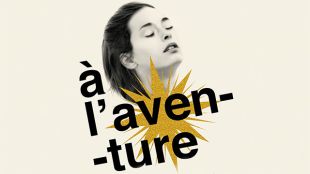
Ever since its French debut, director Jean-Claude Brisseau's À l'Aventure has been courting a reputation as one of those notorious pieces of arthouse eroticism that push sexuality to degrees of explicitness generally unseen in a mainstream context, along the lines of Stanley Kubrick's Eyes Wide Shut or Patrice Chéreau's Intimacy. While that may be accurate in the literal sense, this film's particular use of sex as a central thematic device remains defiantly (and impressively) its own - likewise its core ideas, voice, and approach. Its degree of overall success, however, is another matter.
The drama hones in on Sandrine (Carole Brana), an impassioned but listless French businesswoman in her twenties. One day, in a local park, her path intersects with a kindly middle-aged ex-physics teacher-turned-philosophical cabbie (Etienne Chicot). He prompts a conversation with Sandrine and expostulates on the way in which contemporary lives often fall prey to the slavery of routine. Sandrine listens intently; the words strike at her core. That evening, she returns to her flat, initiates sex with her fiancé, and experiences intercourse so mechanical and so dissatisfying that it would not, by any stretch of the imagination, qualify as lovemaking. Thereafter, she begins a series of attempts to loosen and break the shackles of routine in her life by plunging into increasingly outrageous sexual behavior, which begins with onanism and a casual affair but moves into group-oriented sexual abuse.

So far, we may feel we're in very familiar territory — the thematic territory traversed so often by Catherine Breillat. But unlike Breillat, Brisseau has little interest in using sexuality to explore the female psyche - he aims more broadly. The writer-director intercuts lewd scenes of desperate sexual activity - naked bodies entangled, searching despairingly for some elusive plateau that transcends any standard emotional or physical crescendo - with poignant, lyrical, and philosophical scenes in which Sandrine revisits the unnamed cabbie in a nonsexual context and he pontificates on the nature of being in a random and chaotic universe.
Given the iciness of the sex scenes, the film almost demands a source of warmth and humanity, and that emerges consistently from the cabbie's exchanges with Sandrine, which are hands-down the most successful elements in the movie. What could be excruciatingly boring in less adept hands here draws us in and hooks us emotionally; we feel we could listen to the cabbie for hours. His words attain their greatest power in a wondrous sequence where Brisseau interpolates a fixed-camera tracking shot, filmed from a single perspective and winding down a sunlit country road, coupled with a voice-over reflection by the cabbie on Einstein's theories about time and space. The scene visually underscores the very essence of existence. The intimacy of the two characters' dialogues neatly and perfectly offsets the almost aimless desperation of the sex sequences, and establishes the existential idea that humankind creates its only real meaning via emotional and intellectual connections with one another — a need that so often accounts for misguided acts of agonized sexual exploration.

The sexual progression within the film feels much less surefooted, and takes a head-scratching turn into metaphysical territory that throws the film way off-course. In a crucial subplot, Sandrine's psychiatrist lover, Greg (Arnaud Binard), hypnotizes several women, with their mutual consent, then selfishly and arrogantly leads them into situations of orgiastic activity and guides another woman through painful repressed memories. This narrative thread reinforces the emotional desperation of many prior sequences, and for that reason, it works. Yet it culminates with a bizarre scene that is almost fatal to the film, where Greg leads the same hypnotized woman to a point of spiritual ecstasy that racks her body with convulsions, forcing her into a state of asexual religious bliss along the lines of many Catholic saints. As if this were not incongruous enough, the film then completely abandons reality and ventures into science fiction, with a sudden and fervent use of special effects (suggesting divine manifestation) that seems pulled from way out of left field.
The metaphysical sequence represents a gross mistake; it directly points to a higher power that is present onscreen, and in so doing, undercuts the existentialist agnosticism of the rest of the film and breaks tone to such a severe degree that it risks eliciting laughter from the audience. Why Brisseau opted to conclude his erotic tale in this manner and contradict the central thesis of his film is baffling.
The remainder of À l'Aventure feels so emotionally and intellectually provocative, daring, and original that it demands to be seen and weighed heavily -- making the aforementioned sequence almost unforgivable. Brisseau does achieve real depth with much of the film, but ultimately falls into pretentiousness in one pivotal and defining moment.
